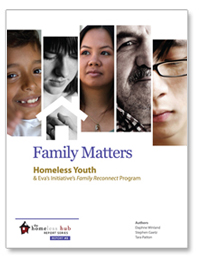So, what do you think of when you see a kid on the street? What crosses your mind? Is he or she a runaway? A dropout? A kid looking for kicks? Is it a young person fleeing abuse at home? Usually, when we think of teenagers, we also think of them in relation to family. They’re young, so they must have parents, brothers and sisters, grandparents, right? But in that moment of contact when you see them sitting on the sidewalk often looking unkept, cold and hungry, family is nowhere to be seen. What comes to my mind when I encounter a homeless youth is that they must be running away from something; something that has clearly gone very wrong.
As a mother, my instinct is that they are vulnerable and need care, and I often wonder how they ended up on the street. I think about whether there is any possibility of reconciling with their families and going home. I also wonder how agencies that serve street youth support them, and what if any efforts are made to help young people reconnect with families? I say this fully cognizant of the fact that many young people are forced to leave very difficult home lives characterized by violence and abuse, and going back may not even be possible.

Our new report, Family Matters (co-authored by Stephen Gaetz and Tara Patton), looks at the experiences of homeless youth and the efforts of Family Reconnect, a unique program delivered through Eva’s Initiatives. Through assessment, counseling and help that allows young people to access appropriate services and supports, the Family Reconnect team work to help young people address underlying conflicts within their families, and hopefully improve relationships to the point that they are able to return home, or move into the community, ideally with family support. Family reconnection can mean making contact with a mom or dad, but also an uncle, aunt, sibling or grandparent. If contact is not possible or desired by a young person, Family Reconnect counselors can help youth come to terms with this reality and move forward with their lives in a healthy and productive way.
Our research demonstrates that for many homeless youth and those at risk of homelessness, family does matter. We have found that not only do youth express the desire to improve relations with family, but that often the problems that forced these kids to leave home have more to do with family member’s struggles with mental health, abuse, poverty and/or addictions, rather than with the problems of the youth themselves. We also found that in many cases, family members couldn’t cope with the challenges of undiagnosed learning or mental health issues of youth, and this can often lead to youth homelessness.
Providing youth and their families with needed support and counseling can lead to the early identification of underlying issues and challenges. From there, the necessary supports can lay the foundation for potential reconciliation with family or community, or allow the young person to move towards independent living in a safe and planned way.
The report also highlights the importance of prevention as a key strategy to addressing youth homelessness. In countries like Australia and the United Kingdom, their response to youth homelessness stresses preventive strategies, including programs in schools to help identify and support young people at risk, early intervention programs that include family mediation, counseling and support, and respite housing to give young people and their families a ‘time out’ period in the midst of a heated conflict. This preventive orientation makes a lot of sense and appears to be very effective in providing young people and their families with the supports they need.
Unfortunately in Canada, preventive programs like Family Reconnect are the exception rather than the rule. More often than not, our response to youth homelessness is characterized by the provision of emergency services such as shelters and day programs. As good as many of these programs are, they tend to focus on helping young people become self-sufficient instead of considering the benefits of helping young people reconnect with family. That is, from this perspective, the family is seen only as part of a young person’s past, not as part of their future. In this report, we propose a radical rethinking of the way we respond to youth homelessness in Canada; one that places prevention and family reconnection at the centre of our response. This is not a cynical appeal to ‘family values’. Rather, it is a call to consider the role that family reconnection can play in helping young people avoid homelessness, and support those who are homeless in moving off the streets as quickly as possible. Have a look at the report. Now what will come to mind the next you cross paths with a homeless youth? Don’t you agree that this kind of reform is necessary?
To access the full report, see: Family Matters: Homeless Youth & Eva's Initiative's Family Reconnect Program
Daphne Winland is Associate Professor and Graduate Program Director for the Department of Anthropology at York University.

